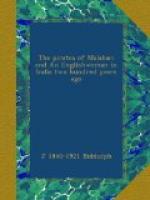In order to strengthen themselves against the Dutch, the Portuguese had ceded Bombay to the English, and then, by their bad faith in retaining Salsette and Thana, they had opened a sore that never was healed. By espousing the quarrel of Mannajee they had earned the enmity of Sumbhajee; and by joining in Sumbhajee’s quarrel against Mannajee they had brought down on themselves the formidable power of the Peishwa. Before long, Sumbhajee turned against them again, and they were left without a single ally to struggle as they could. Their intervention in Angrian quarrels was the final cause of the downfall of Portuguese power on the West coast.
The old political landmarks were fast disappearing. Everywhere the Mogul power was crumbling to pieces, and new principalities were being formed. The Peishwa had shaken off his allegiance to Satara, and his armies were making his authority felt all over Hindostan and the Deccan; while Mahratta rule was being established in Guzerat by the Gaicowar. The Dutch and French had ceased to make progress; the Portuguese power was on the wane; the Seedee was losing territory under the attacks of Mannajee and the Peishwa, while the Angrian power was divided. Meanwhile, the Company’s position on the West coast was steadily improving. European pirates had ceased to haunt the Indian seas; Mannajee Angria found it necessary to maintain good relations with the English, though occasional acts of hostility showed that he was not to be trusted; while the Peishwa, whose aims were directed inland, had no quarrel with them, and concluded a treaty with Bombay. Trade was flourishing, though the piracies of Sumbhajee Angria, in spite of his feud with Mannajee, caused losses from time to time. The English ships, better manned and better found, no longer contented themselves with repelling attacks, but boldly cruised in search of Sumbhajee’s vessels, capturing them or driving them to seek refuge in their fortified harbours.
To relate in detail all the encounters that took place would be tedious; but some of them may be mentioned, in order to give an idea of the warfare that went on for thirty years after Boone’s relinquishment of office.




